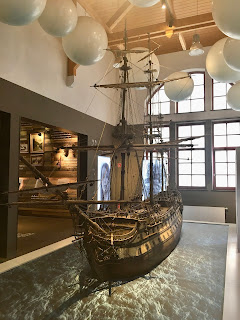The only reason I knew about the Ballinstadt Museum in Hamburg was because it was advertised on the back of a city map that someone left at our apartment after a visit. I can’t for the life of me remember who went through Hamburg on their way to us, but there was the map in my travel keepsakes box, calling me north. I opened the map for the first time on the last leg of my train journey, and the Ballinstadt Emigrant Museum immediately spurred my interest.

What a totally cool and unique experience this museum is! There was an entire compound village in this area that Albert Ballin — son of Danish-Jewish immigrants to Germany — built to house and prepare Germans for their grand voyage across the ocean to the New World. This compound functioned throughout the nineteenth century and just until the 1930s when the Nazis came to power.
Living in Germany has taught me SO many things about my own heritage and also more history about America. Like about beer culture and why more breweries have German-derivative sounding names. About dinner time being appropriately on time at 5 p.m. About being early as a virtue. Kindergarten, meat and potatoes, the way white people garden and landscape, the reason older interior design was NOT open-concept, and so many other unnoticed things we take for granted as part of American culture.
Well. It came from somewhere else. In fact, WE came from somewhere else. With the never-ending tide of arguments on immigration policy in the United States, it would serve us well to think hard back to our ancestors. Ballinstadt does just that: it takes you back.
There is absolutely a high chance that my ancestors walked through the very same emigration halls on their way to America. We all come from somewhere, and most of my heritage can be traced to Germany and Ireland. One of my maternal ancestors, Mattheus Schoch, came to Pennsylvania from Germany to work as an indentured servant for several years before securing his free status.
These people — just as real as you or me — took very real risks and made huge sacrifices to uproot their entire lives to pursue what would hopefully be a brighter future for themselves and their families.
Once they got on the ship, there was no turning back. Some wouldn’t survive the trip, some boats sank, and, for sure, not everyone found what they were looking for upon their arrival.
But The American Dream was such a powerful concept to draw literally millions of people away from their homeland. I understand that my own move back to the Old World is a bit of a reverse ideal, but I like to think that I am honoring my heritage by now speaking German and representing America back in the home country.
These questions surrounding Lady Liberty are very poignant to me because I have been asked the same questions as an immigrant in France and Germany. I can actually relate to the anxiety of making sure the question is understood to produce the correct answer and the stress of knowing that one wrong move could prevent my papers from being approved. From emigrant status in your home country to immigrant status in your new country, there is a huge shift in acceptance and support. An emigrant leaves their home country usually with a slap on the back, cheers, and “good for you’s” all around. An immigrant arrives in their new country to difficult paperwork in another language, suspicious border control officials, and a severe lack of easy access to resources.
For our personal arrivals to new countries, simple tasks like getting a doctor appointment or asking for directions became overwhelmingly difficult. It took three months to get an internet connection. We drank tea for medicine when our imported supply ran out. We gave up trying to find super specific ingredients in stores. If we couldn’t figure it out on our own or through a local friend, whatever it was had to become part of the past. New solutions were found; we had to adapt.
And our immigration story has been EASY, compared to most accounts. For as stressful and frustrating as our journey has been over the past decade, we are very grateful for our experience and aware that most immigrants to many modern countries have not had the same opportunities or connections as we have had.
This display reminds its readers, “Don’t forget your German language!” As 21st century Americans, we do not realize how much World War I and World War II severely impacted our cultural heritage. Take the time to do some research on German settlements, schools, and churches in America before World War I struck. The Midwest was basically German. After WWI, there was a push for more “Americanization” and German culture in America began to diminish. By the time Hitler shoved his way to the front of global uproar, speaking German in America became seen as anti-American.
This poster is interesting for WAY too many reasons.
Basically, from 1914 until 1945, the German heritage in America transitioned to melding with other white European heritages with the English language, but retained so much of the cultural tendencies I mentioned earlier in this post.
I don’t mind being an immigrant. In most ways, I get to identify as an “expatriate,” which is essentially a snobby way to say “successful immigrant.” I wish it were easier for everyone who wants to live and work in another country to get the right documentation. I have been undocumented before, and it is not fun or exciting.
For Americans, it is easy to jump on the anti-immigration bandwagon because “they will steal our jobs,” “they won’t pay taxes,” “they don’t speak English,” etc. It would do us well to remember the reality of our ancestors who were also likely discriminated against and not trusted when they entered the American Dream. Just because we “feel” American due to decades or even centuries of integration and forgetting the past, does not change the fact that most of our “American” ancestors were born from immigrants. Our family trees are FULL of immigrants; these people made the decisions that ended up allowing us our American status!
Can we imagine if these German immigrant families had been separated—children from parents—upon entry into their “better future” in the United States?!
It would do us even better to remember the reality that the white American ancestry stole the land from, enforced taxes upon, and mandated English and religious learning for the actual Native Americans and indigenous peoples of the Americas.
America was born on borrowed [stolen] land. Since we are not going to give it back anytime soon, then it only makes sense to share it with the same kind of brave people as our Great-Great-Great-Great-Great-Great-Great-Grandfathers, like Mattheus Schoch.

















